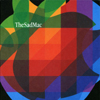Headz
 This isn't the first time Mathieu has taken up therecordings of others for his own revision, but it feels now like atotal revisioning, something with legs. What might seem like a fairlystraight-up digital drone recording up front reveals later to be acavernous amalgam of disparate sources and foreign intents feeding twosoftwares' insatiable and somehow melancholy blanket constructions bydeep and luscious weaves of histrionic and celestial noise. Theartist's own intent is either invisible or secondary to a giganticprimary. After a long list of Matheiu's sound-sourcing "collaborators"on the back of another beautiful Headz package job, each track featuresthe artist's poetic descriptions and instruments used. Three of thelonger tracks are Mathieu's commissioned sound portion for a German daVinci exhibit. Another is a dance piece soundtrack featuring violadrones run through "the Death Chimes of a Macintosh Classic IIcomputer." The digitally homogenized strains of a classical vocalquartet, stewing with hammered dulcimer, harpsichord, and Handel sonatafragments precedes a fascinating track where the sounds of Mathieu'sdaughter "cooking sticks-and-stones soup" combine with Derek Holzer'sStarfield Recordings for a Latvian Spacelab project. On "Smile,"Mathieu's pump organ, "playing a motor's endless drone" finds the sadpassing of time in an Italian waiter reciting Luigi Pulci. Wheneverything is not a quaking, sumptuous mess of drone, the artist backsup to let the machine assert more than its own making. Track one,"Anakrousis," styled as an ancient Greek overture, is all log-insquelches and the humming click of start-up. Later appeals to the AppleIIe and a primitive digitizing of a 1909 phonograph recording point toMathieu's interest in engaging his computer with a huge history ofrecorded and un-recorded sound-making. The great, droning melancholyalive in all of these tracks takes the artist's gesture far from commonironic or self-referential goals. His title exploits the mystery ofnow-commonplace items and methods being filtered through time andassigned personality, while at the same time introducingnon-intellectual music perfect for sleepy drift-off. My best comparisonis the work of Akira Rabelais (whose software Mathieu uses), whose Benediction, Draw was a favorite laptop release in past years as The Sad Mac could be this year.
This isn't the first time Mathieu has taken up therecordings of others for his own revision, but it feels now like atotal revisioning, something with legs. What might seem like a fairlystraight-up digital drone recording up front reveals later to be acavernous amalgam of disparate sources and foreign intents feeding twosoftwares' insatiable and somehow melancholy blanket constructions bydeep and luscious weaves of histrionic and celestial noise. Theartist's own intent is either invisible or secondary to a giganticprimary. After a long list of Matheiu's sound-sourcing "collaborators"on the back of another beautiful Headz package job, each track featuresthe artist's poetic descriptions and instruments used. Three of thelonger tracks are Mathieu's commissioned sound portion for a German daVinci exhibit. Another is a dance piece soundtrack featuring violadrones run through "the Death Chimes of a Macintosh Classic IIcomputer." The digitally homogenized strains of a classical vocalquartet, stewing with hammered dulcimer, harpsichord, and Handel sonatafragments precedes a fascinating track where the sounds of Mathieu'sdaughter "cooking sticks-and-stones soup" combine with Derek Holzer'sStarfield Recordings for a Latvian Spacelab project. On "Smile,"Mathieu's pump organ, "playing a motor's endless drone" finds the sadpassing of time in an Italian waiter reciting Luigi Pulci. Wheneverything is not a quaking, sumptuous mess of drone, the artist backsup to let the machine assert more than its own making. Track one,"Anakrousis," styled as an ancient Greek overture, is all log-insquelches and the humming click of start-up. Later appeals to the AppleIIe and a primitive digitizing of a 1909 phonograph recording point toMathieu's interest in engaging his computer with a huge history ofrecorded and un-recorded sound-making. The great, droning melancholyalive in all of these tracks takes the artist's gesture far from commonironic or self-referential goals. His title exploits the mystery ofnow-commonplace items and methods being filtered through time andassigned personality, while at the same time introducingnon-intellectual music perfect for sleepy drift-off. My best comparisonis the work of Akira Rabelais (whose software Mathieu uses), whose Benediction, Draw was a favorite laptop release in past years as The Sad Mac could be this year.samples:
Read More

